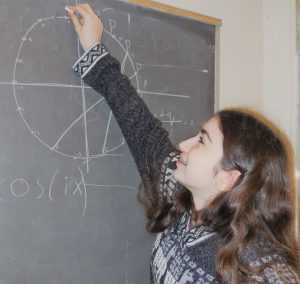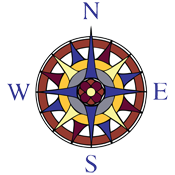




All | Math | Science/Technology | Extracurricular | Humanities/Social Sciences | Art/Music | Language Arts | Foreign Languages
Algebra I (Tue, Fri)
Quarter 1,2,3,4: Starts on September 9, 2025
Class Time: 11:00 am Duration: 55 min
Instructor: David Chelf
Grade Range: 7th-10th
Prerequisites: Pre-Algebra
This is a complete course in high school Algebra I which will cover fundamental concepts in algebra and provide a solid foundation of mathematical literacy, problem solving, reasoning, and critical thinking skills that are necessary for the exploration of more advanced and rigorous topics in mathematics. This course is designed to emphasize the study of algebraic problem-solving with the incorporation of real-world applications. Topics in Algebra I include number systems, linear systems, rational numbers, complex numbers, exponents, roots, radicals, quadratic equations, polynomials, factoring, absolute values, ratios, and proportions. In addition, the course will cover solving and graphing systems of functions, linear equations, and inequalities. Students will explore these topics through class discussions, practice problems, and open-ended problem-solving.
Prerequisite: Students should have a solid foundation in pre-algebra topics in order to take this class. In addition, students should be capable of copying the sample problems and solutions worked in class on the white board to his/her own notes as examples for completing homework.
Workload: Students should expect to spend 1-1.5 hours per day on reading, review, and homework on most non-class days. Homework assignments will run on a 7-day cycle, with assignments posted on Thursdays and due the following Thursday. Students are advised to start homework once it is assigned (i.e., not wait until the night before it is due). Weekly homework assignments will be of a length that a student should be able to complete them in two or three at-home work sessions. Solutions will be provided for some homework problems, but students are expected to show all steps of their work.
Assignments: The Canvas online class management system will be used to post assignments and scores. Students should have their own e-mail address in order to be set up as users of the Canvas system. Parents can also be set up as Canvas guests/observers for purposes of tracking the student's progress and workload.
Assessments: Student progress will be assessed by: (1) The instructor checking that weekly homework sets are attempted and complete and (2) detailed grading of periodic take-home tests. Parents will be able to view accumulated points awarded in the class for the purpose of determining a parent-awarded course grade. See the instructor's webpage for detailed homework and test policy, including late work and re-work.
Textbook: Students should purchase the 2024 paperback reprint of: "Algebra I" by Paul A Foerster as sold by Veritas Press (https://store.veritaspress.com/foerster-algebra-i-student-text.html)
Credit: Homeschool families may wish to count this course as a complete credit in Algebra I for purposes of a high school transcript.
Algebra II
Quarter 1,2,3,4: Starts on September 8, 2025
Class Time: 11:00 am Duration: 55 min
Instructor: David Chelf
Grade Range: 8th-11th
Prerequisites: Algebra I
This is a complete course in high school Algebra II which will cover fundamental concepts and provide a solid foundation of mathematical literacy, problem solving, reasoning, and critical thinking skills that are necessary for the exploration of more advanced and rigorous topics in mathematics. Topics in Algebra II include linear functions, systems of equations and inequalities, quadratic functions and complex numbers, exponential and logarithmic functions, rational and irrational algebraic functions, and quadratic relations and systems. In addition, this course will cover higher degree functions with complex numbers, sequences and series, probability, data analysis, and trigonometric and circular functions. Students will explore these topics through class discussions, practice problems, and open-ended problem solving.
Prerequisite: Students should have a solid foundation Algebra I in order to take this class.
Workload: Students should expect to spend 1-1.5 hours per day on reading, review, and homework on most non-class days. Homework assignments will run on a 7-day cycle, with assignments posted on Thursdays and due the following Thursday. Students are advised to start homework once it is assigned (i.e., not wait until the night before it is due). Weekly homework assignments will be of a length that a student should be able to complete them in two or three at-home work sessions. Solutions will be provided for some homework problems, but students are expected to show all steps of their work.
Assignments: The Canvas online class management system will be used to post assignments and scores. Students should have their own e-mail address in order to be set up as users of the Canvas system. Parents can also be set up as Canvas guests/observers for purposes of tracking the student's progress and workload.
Assessments: Student progress will be assessed by: (1) The instructor checking that weekly homework sets are attempted and complete and (2) detailed grading of periodic take-home tests. Parents will be able to view accumulated points awarded in the class for the purpose of determining a parent-awarded course grade. See the instructor's webpage for detailed homework and test policy, including late work and re-work.
Textbook: Students should purchase or rent the required textbook for this class: Algebra and Trigonometry: Functions and Applications- Prentice Hall Classics (ISBN-10 0131657100, ISBN-13 978-0131657106). A scientific calculator similar to the Casio fx-115ES PLUS is required for this class.
Credit: Homeschool families may wish to count this course as a complete credit in Algebra II for purposes of a high school transcript.
Geometry
Quarter 1,2,3,4: Starts on September 9, 2025
Class Time: 1:00 pm Duration: 55 min
Instructor: David Chelf
Grade Range: 8th-11th
Prerequisites: Algebra I
This is a complete course in high school Geometry which will cover fundamental concepts and provide a solid foundation of mathematical literacy, problem solving, reasoning, and critical thinking skills that are necessary for the exploration of more advanced and rigorous topics in mathematics. Students will learn deductive reasoning, and logic by completing geometric proofs. Topics in geometry include: lines, angles, congruence, concurrence, inequalities, parallel lines, quadrilaterals, transformations, area, similarity, right triangles, circles, regular polygons, and geometric solids. Students will explore these topics through class discussions, practice problems, and open-ended problem solving.
Prerequisite: Students should have a solid foundation in Algebra I in order to take this class.
Workload: Students should expect to spend 1-1.5 hours per day on reading, review, and homework on most non-class days. Homework assignments will run on a 7-day cycle, with assignments posted on Thursdays and due the following Thursday. Students are advised to start homework once it is assigned (i.e., not wait until the night before it is due). Weekly homework assignments will be of a length that a student should be able to complete them in two or three at-home work sessions. Solutions will be provided for some homework problems, but students are expected to show all steps of their work.
Assignments: The Canvas online class management system will be used to post assignments and scores. Students should have their own e-mail address in order to be set up as users of the Canvas system. Parents can also be set up as Canvas guests/observers for purposes of tracking the student's progress and workload.
Assessments: Student progress will be assessed by: (1) The instructor checking that weekly homework sets are attempted and complete and (2) detailed grading of periodic take-home tests. Parents will be able to view accumulated points awarded in the class for the purpose of determining a parent-awarded course grade. See the instructor's webpage for detailed homework and test policy, including late work and re-work.
Textbook: Students should purchase or rent the required textbook for this class: Geometry: Seeing, Doing, Understanding, 3rd edition (ISBN-10 0716743612, ISBN-13 978-0716743613) A calculator is not needed for this course.
Credit: Homeschool families may wish to count this course as a complete credit in Geometry for purposes of a high school transcript.
Manipulating Math: Geometry Games
Quarter 3: Starts on January 22, 2026
Class Time: 2:00 pm Duration: 55 min
Instructor: Becca Sticha
Grade Range: 3rd-4th
Prerequisites: None
Without geometry, life might be POINTless! Shapes are everywhere! We will sort them into categories and answer questions like, "Is a square always a rectangle?" Design a hidden picture puzzle to share with your friends, learn about edges and vertices by building 3-D solids, use cubes to fill containers and explore volume, discover Pi for yourself by measuring circles, create Cartesian art by using a coordinate grid and ordered pairs, and more! Each week, master a new concept with hands-on, real world math!
This class will begin on 1/22/26 and meet on 3/12/26.
Topics will include angles, polygons, triangles, circles, three dimensional solids and more. Students will practice problem solving skills, reasoning, and basic math in this class.
Topics in this Series: Measurement Madness (Quarter 1); Fun with Fractions (Quarter 2); Geometry Games (Quarter 3); and Simple Statistics (Quarter 4)
Number Ninjas: Learning Logic
Quarter 3: Starts on January 22, 2026
Class Time: 1:00 pm Duration: 55 min
Instructor: Becca Sticha
Grade Range: 1st-2nd
Prerequisites: None
Does your child learn best by hands-on activities, crafts, games, and stories? Number Ninjas is based on the belief that children need to work with mathematics in a concrete, physical, and tangible way in order to learn fundamental concepts. Young students will love learning numerical concepts in this interactive, exploration-based class where work with numbers feels like a game.
Third quarter, students will play games, complete puzzles, and examine riddles as an introduction to logic, critical thinking, and reasoning skills.
This class covers many of the 1st and 2nd grade Standards of Learning for math. Weekly update e-mails to parents will include suggestions for practice at home and extension activities.
This class will begin on 1/22/26 and meet on 3/12/26.
Topics in the Series: Patterns & Properties (Quarter 1), Money Math (Quarter 2), Learning Logic (Quarter 3), and Math in Nature (Quarter 4).
Pre-Algebra
Quarter 1,2,3,4: Starts on September 9, 2025
Class Time: 11:00 am Duration: 55 min
Instructor: Jennifer Hallworth
Grade Range: 7th-9th
Prerequisites: None
This is a complete course in Pre-Algebra that will provide an introduction to basic algebra concepts and a review of arithmetic algorithms with an emphasis on problem solving. The major topics covered in this course are Numbers and Operations, Expressions and Properties, Equations and Inequalities, Functional Relationships and Ratios, Percent and Proportions. Students will learn to use formulas to solve a variety of math problems encompassing geometry, measurement probability, and statistics. Students will also be applying their learning to real life scenarios to solve problems.
Prerequisites: Students must be fluent in the four basic operations- addition, subtraction, multiplication and division. They will need to show proficiency and have a thorough command of basic computation. In addition, a basic, introductory understanding and ability to work with fractions and decimals is required to solve equations and simplify expressions. If you are unsure about your child's readiness for this class, the instructor will recommend one or more practice platforms and/or assessments to confirm placement.
Workload: Students should expect to spend 3-4 hours per week outside of class to complete practice problems, homework, and assessments.
Assignments: All assignments will be posted on password-protected Canvas classroom management site. There, students access assignments, upload homework, link to quizzes and tests, track grades, and message the instructor and classmates.
Assessments: All chapter tests will be taken outside of class with parental oversight to maximize in-class instructional time. Points will be assigned for completed homework, quizzes, and tests. A letter grade will not be assigned, but parents can use total points earned versus total points offered to assign a grade for purposes of a homeschool transcript. Parents can view total points earned at any time through the Canvas site. See the instructor's webpage for detailed homework and test policy, including late work and re-work.
Textbook: The selected textbook is available free online, and a link will be posted on Canvas. Students who prefer a hard copy textbook may purchase or rent McDougall Littell's Pre-Algebra (ISBN #978-0618250035). As an alternative, for any student who struggles with reading, the textbook can be purchased as an audio CD (ISBN #978-0618478828).
What to Bring: TI-34 calculator
Credit: Homeschool families may wish to count this course as a full credit in Mathematics for purposes of a high school transcript.
Preparation for Pre-Algebra
Quarter 1,2,3,4: Starts on September 9, 2025
Class Time: 10:00 am Duration: 55 min
Instructor: Jennifer Hallworth
Grade Range: 6th-8th
Prerequisites: None
Preparation for Pre-Algebra is a year-long curriculum that will teach the fundamentals a student must master before embarking pre-algebra, algebra, and beyond. The class will review arithmetic skills, operations, and number theory. Key topics include fractions, rates, ratios, decimals, and percentages. Students will learn the computational operations of adding, subtracting, multiplying, and dividing fractions and decimals. They will learn what decimals stand for, how they relate to fractions, and how to convert between the two. They will discover how rates and ratios are also fractions. Students will learn how to work with negative numbers including strategies for completing all four common operations with negative numbers. The class will also cover exponents and orders of magnitude to make sense of really small and really big numbers and common operations.
This class will also emphasize real world applications of the mathematical concepts through word problems so students become comfortable switching between prose (written descriptions) and mathematical representation (numbers, symbols) of real world examples such as money, mileage, weights, percentages, and scientific measures.
Prerequisites: This course can be considered a pre-pre-algebra class that will teach the core concepts typically covered in later elementary school/early middle school after a general arithmetic curriculum and before pre-algebra. While different curriculums and student pacing will vary, this class would be appropriate for a student who has successfully covered long division, multiplication of multiple digit numbers, and an introduction to simple fractions and who has complete mastery of multiplication facts, skills often aligned with 5th grade mathematics.
Workload: Students should expect to spend 3-4 hours per week outside of class to complete practice problems, homework, and assessments.
Assignments: The Canvas online class management system will be used to post assignments and scores. Students should have their own e-mail address to be set up users of the Canvas system. Parents can also be set up as Canvas guests/observers for purposes of tracking the student's progress and workload.
Assessments: In this class, the instructor will assess a student's progress by: checking that weekly homework sets are complete; spot-checking the full solution 1-2 select problems in class each week, and giving quarterly take-home tests. Points will also be awarded for class participation. Parents will be able to view accumulated points awarded in the class for purpose of determining a parent-awarded course grade.
Textbook: Students should rent of purchase the class text: EP Math 5/6 Workbook (ISBN# 979-8643323693).
Probability & Statistics (On-Level or Honors)
Quarter 1,2,3,4: Starts on September 9, 2025
Class Time: 2:00 pm Duration: 55 min
Instructor: David Chelf
Grade Range: 10th-12th
Prerequisites: Algebra I
The odds of winning the Powerball jackpot are 1 in 292 million. 77% of teens ages 12-17 have cell phones. One out of every two youth voters cast a ballot in 2020. From election polls to stock market data and weather reports to medical test results, statistics and probability are all around us. They are quoted in the podcasts we listen to, the news we watch, and the textbooks and articles we read. Statistics and probability are used in almost every field of study and career for forecasting, decision making, and tracking progress. In 2021-22, the government will release a tsunami of 2020 census statistics about our country's population. (Coincidentally, the odds of a tsunami hitting the east coast- less than the Powerball win.) But statistics and probability are also often misused, misquoted or incorrectly applied, so having a solid understanding of what these numbers represent will help make teens informed consumers and decision-makers.
This course will explore the collection and analysis of data, inferences and conclusions, and the use of this information. Themes include relationships between variables, gathering data, interpreting categorical versus quantitative data. The class will also cover sample surveys, experiments, and observational studies and evaluate randomness and probability. Finally, students will learn about making inferences, justifying conclusions, and using probability to make decisions.
Prerequisite: Students should have a solid foundation in Algebra I and Geometry in order to take this class. It is an ideal class for a student who needs an additional credit in high school math, but who may not wish to pursue more advanced mathematics courses such as Algebra II and Pre-Calculus.
Levels: The course provides a substantive, full-credit experience on either an Honors or On-Level track. All class members share core material and participate in the same class lectures. Honors students will receive additional, more challenging problems. Students register online for the same course but must indicate which level they wish to follow by the first day of class. Students may move down a level (from Honors to On-Level) at any time.
Workload: Students should expect to spend 1-1.5 hours per day on reading, review, and homework on most non-class days. Homework assignments will run on a 7-day cycle, with assignments posted on Thursdays and due the following Thursday. Students are advised to start homework once it is assigned (i.e., not wait until the night before it is due). Weekly homework assignments will be of a length that a student should be able to complete them in two or three at-home work sessions. Solutions will be provided for some homework problems, but students are expected to show all steps of their work.
Assignments: The Canvas online class management system will be used to post assignments and scores. Students should have their own e-mail address in order to be set up as users of the Canvas system. Parents can also be set up as Canvas guests/observers for purposes of tracking the student's progress and workload.
Assessments: Student progress will be assessed by: (1) The instructor checking that weekly homework sets are attempted and complete and (2) detailed grading of periodic take-home tests. Parents will be able to view accumulated points awarded in the class for the purpose of determining a parent-awarded course grade. See the instructor's webpage for detailed homework and test policy, including late work and re-work.
Textbook: The required textbook for this class is "Stats In Your World" 1st edition by David E. Bock (ISBN-13: 978-0131384897).
Credit: Homeschool families may wish to count this course as a complete credit in Probability & Statistics for purposes of a high school transcript.
8 events displayed.

